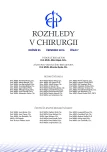Technical background of data collection for parametric observation of total mesorectal excision (TME) in rectal cancer
Authors:
M. Bláha 1; J. Hoch 2; A. Ferko 3; A. Ryška 4; E. Hovorková 4
Authors‘ workplace:
Institut biostatistiky a analýz, Masarykova univerzita, Brno
ředitel: doc. RNDr. Ladislav Dušek, Ph. D.
1; Chirurgická klinika 2. LF Univerzity Karlovy a FN Motol, Praha
přednosta: prof. MUDr. J. Hoch, CSc.
2; Chirurgická klinika FN Hradec Králové
přednosta: MUDr. M. Leško, Ph. D.
3; Fingerlandův ústav patologie, FN Hradec Králové
přednosta: prof. MUDr. A. Ryška, Ph. D.
4
Published in:
Rozhl. Chir., 2016, roč. 95, č. 7, s. 272-279.
Category:
Original articles
Overview
Introduction:
Improvement in any human activity is preconditioned by inspection of results and providing feedback used for modification of the processes applied. Comparison of experts’ experience in the given field is another indispensable part leading to optimisation and improvement of processes, and optimally to implementation of standards. For the purpose of objective comparison and assessment of the processes, it is always necessary to describe the processes in a parametric way, to obtain representative data, to assess the achieved results, and to provide unquestionable and data-driven feedback based on such analysis. This may lead to a consensus on the definition of standards in the given area of health care.
Method:
Total mesorectal excision (TME) is a standard procedure of rectal cancer (C20) surgical treatment. However, the quality of performed procedures varies in different health care facilities, which is given, among others, by internal processes and surgeons’ experience. Assessment of surgical treatment results is therefore of key importance. A pathologist who assesses the resected tissue can provide valuable feedback in this respect.
Results:
An information system for the parametric assessment of TME performance is described in our article, including technical background in the form of a multicentre clinical registry and the structure of observed parameters.
Conclusion:
We consider the proposed system of TME parametric assessment as significant for improvement of TME performance, aimed at reducing local recurrences and at improving the overall prognosis of patients.
Key words:
rectal cancer − total mesorectal excision − parametric data − clinical registries −TME registry
Sources
1. Ferlay J, Soerjomataram I, Ervik M, et al. GLOBOCAN 2012 v1.0, Cancer Incidence and Mortality Worldwide: IARC CancerBase No. 11 [Internet]. Lyon, France: International Agency for Research on Cancer; 2013. Available from: http://globocan.iarc.fr, accessed on 17/01/2016.
2. Dušek L, Mužík J, Kubásek M, et al. Epidemiologie zhoubných nádorů v České republice [online]. Masarykova univerzita, Brno 2005. Dostupný z www: http://www.svod.cz.
3. Garlipp B, Ptok H, Schmidt U, et al. Factors influencing the quality of total mesorectal excision. Br J Surg 2012;99 : 714−20.
4. Ferko A, Örhalmi J, Nikolov DH, et al. Radikalita resekční léčby pro karcinom rekta: Analýza prediktivních faktorů spojených s nekompletní mezorektální excizí. Rozhl Chir 2013;92 : 304−10.
5. Nagtegaal ID, van de Velde CJH, Marijnen CA, et al. Low rectal cancer: a call for a change of approach in abdominoperineal resection. J Clin Oncol 2005;23 : 9257–64.
6. West NP, Finan PJ, Anderin C, et al. Evidence of the oncologic superiority of cylindrical abdominoperineal excision for low rectal cancer. J Clin Oncol 2008;26 : 3517–22.
7. Herzog T, Belyaev O, Chromik AM, et al. TME quality in rectal cancer surgery. Eur J Med Res 2010;15 : 292–6.
8. Ihnát P, Martínek L, Ihnát Rudinská L, et al. Cirkumferenčný resekčný okraj v modernej liečbe karcinómu reckta. Rozhl Chir 2013; 92 : 297−303.
9. Leonard D, Penninckx F, Fieuws S, et al. Factors predicting the quality of total mesorectal excision for rectal cancer. Ann Surg 2010;252 : 982–8.
10. Lange MM, Martz JE, Ramdeen B, et al. Long-term results of rectal cancer surgery with a systematical operative approach. Ann Surg Oncol 2013;20 : 1806−15.
11. Brandt CA, Gadagkar R, Rodriguez C, et al. Managing complex change in clinical study metadata. J Am Med Inform Assoc 2004;11 : 380–91.
12. Klimeš D, Šmíd R, Pavliš P, et al. Informační technologie pro současnou onkologii - sběr a analýza dat. Klin Onkol 2004;17 : 97−100.
13. Harris PA, Taylor R, Thielke R, et al. Research electronic data capture (REDCap) − A metadata-driven methodology and workflow process for providing translational research informatics support. Journal of biomedical informatics 2009;42 : 377−81.
14. Waclawski E. How I Use It: Survey Monkey. Occupational Medicine 2012;62 : 477.
Labels
Surgery Orthopaedics Trauma surgeryArticle was published in
Perspectives in Surgery

2016 Issue 7
- Possibilities of Using Metamizole in the Treatment of Acute Primary Headaches
- Metamizole at a Glance and in Practice – Effective Non-Opioid Analgesic for All Ages
- Metamizole vs. Tramadol in Postoperative Analgesia
-
All articles in this issue
- Special contact splints in postoperative care for patients with the diabetic foot
- Parametric monitoring of the quality of total mesorectal excision and surgical treatment of rectal carcinoma − results of a multicenter study
- Technical background of data collection for parametric observation of total mesorectal excision (TME) in rectal cancer
-
Reverzný prístup k synchrónnym pečeňovým metastázam kolorektálneho karcinómu
Absolvovanie liečebného protokolu, strednodobé (trojročné) prežívanie a vzorec progresie ochorenia u 32 pacientov - Rare injury of perineum and anorectum – case report
- Cecal herniation through the foramen of Winslow as a rare cause of ileus
- Juxtapapillary duodenal diverticulum causing pancreatobiliary problems - case report and literature review
- 51st Congress of the European Society for Surgical Research, 25−28 May 2016, Prague, Czech Republic
- Perspectives in Surgery
- Journal archive
- Current issue
- About the journal
Most read in this issue
- Juxtapapillary duodenal diverticulum causing pancreatobiliary problems - case report and literature review
- Cecal herniation through the foramen of Winslow as a rare cause of ileus
- Parametric monitoring of the quality of total mesorectal excision and surgical treatment of rectal carcinoma − results of a multicenter study
- Special contact splints in postoperative care for patients with the diabetic foot
